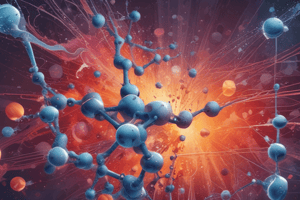Podcast
Questions and Answers
An example of a heterogeneous mixture is:
An example of a heterogeneous mixture is:
- Brass
- Bronze
- Water
- Concrete (correct)
Which of the following is an intensive property?
Which of the following is an intensive property?
- Mass
- Number of molecules
- Weight
- Volume
- Density (correct)
Which is NOT a pure substance?
Which is NOT a pure substance?
- Water
- Brass (correct)
- Chlorine
- Copper
Which of the following is classified as a mixture?
Which of the following is classified as a mixture?
Which is NOT a mixture?
Which is NOT a mixture?
A sugar cube dissolved in water is an example of a ______ change.
A sugar cube dissolved in water is an example of a ______ change.
Substances produced when atoms chemically combine with each other are called _____
Substances produced when atoms chemically combine with each other are called _____
Water is an example of a _____
Water is an example of a _____
Which of the following properties of a substance does not change when the amount of the substance changes? What type of property is it?
Which of the following properties of a substance does not change when the amount of the substance changes? What type of property is it?
All changes in phase (or state of matter) are:
All changes in phase (or state of matter) are:
You can easily compress a gas because:
You can easily compress a gas because:
Solids have a ______ shape, a ______ volume, and ______ be compressed.
Solids have a ______ shape, a ______ volume, and ______ be compressed.
Liquids have a ______ shape, a ______ volume, and ______ be compressed.
Liquids have a ______ shape, a ______ volume, and ______ be compressed.
Gases have a ______ shape, a ______ volume, and ______ be compressed.
Gases have a ______ shape, a ______ volume, and ______ be compressed.
How is a mixture different from a compound?
How is a mixture different from a compound?
Compounds are:
Compounds are:
Which of the following is an extensive physical property?
Which of the following is an extensive physical property?
One way of telling whether a mixture is a solution or a suspension is by:
One way of telling whether a mixture is a solution or a suspension is by:
An example of a homogeneous mixture is:
An example of a homogeneous mixture is:
The Tyndall effect is a method used to tell apart _____ and ______.
The Tyndall effect is a method used to tell apart _____ and ______.
Colloids _____ a Tyndall effect.
Colloids _____ a Tyndall effect.
Solutions _______ a Tyndall effect.
Solutions _______ a Tyndall effect.
Describe the Tyndall effect.
Describe the Tyndall effect.
List the 6 ways to separate matter physically:
List the 6 ways to separate matter physically:
Flashcards are hidden until you start studying
Study Notes
Mixtures and Pure Substances
- Heterogeneous mixtures contain visibly different substances, e.g., concrete.
- Intensive properties, such as density, remain unchanged regardless of the amount of substance.
- Brass is not a pure substance; it is a mixture of metals.
- Tap water is classified as a mixture, while distilled water is a pure substance.
- Sodium chloride (table salt) is a pure substance and not a mixture.
Properties of Matter
- A sugar cube dissolving in water is an example of a physical change, not a chemical one.
- Compounds are substances formed when atoms chemically combine and consist of more than one element.
- Water is a classic example of a compound, specifically distilled water.
- Temperature is an intensive property that does not change with the quantity of substance, unlike mass which is extensive.
Changes in State
- Changes in phase or state of matter, such as melting or boiling, are considered physical changes.
- Gases can be compressed due to the significant empty space between particles.
- Solids have a definite shape and volume and cannot be compressed, while liquids have a definite volume but an indefinite shape and can be slightly compressed. Gases have neither a definite shape nor volume and can be compressed easily.
Characteristics of Mixtures vs. Compounds
- Mixtures can be separated by physical means; compounds cannot.
- Compounds are pure substances made up of more than one element and cannot be physically separated.
Physical Properties
- Extensive properties, like mass, depend on the amount of substance present.
- The Tyndall effect distinguishes between colloids and solutions by observing light scattering: colloids show this effect, while solutions do not.
- The Tyndall effect occurs when light is reflected by particles too small to be seen, helping to identify the nature of the mixture.
Methods of Separating Matter
- Matter can be separated physically through various methods:
- Density difference (e.g., separating water and oil).
- Filtration to remove insoluble solids from liquids.
- Chromatography, as demonstrated in ink experiments.
- Distillation, based on varying boiling points.
- Evaporation to leave solids behind.
- Magnetism to attract certain materials from a mixture.
Studying That Suits You
Use AI to generate personalized quizzes and flashcards to suit your learning preferences.




